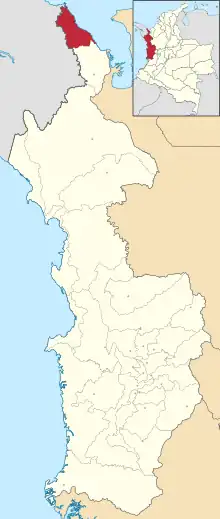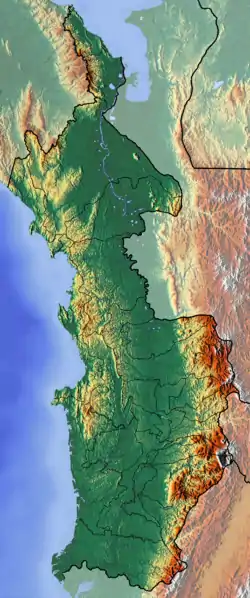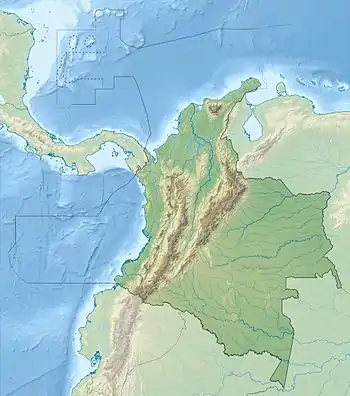Sapzurro | |
|---|---|
Municipality and town | |
 Location of the municipality and town of Acandí in the Chocó Department of Colombia | |
 Sapzurro Location in Colombia  Sapzurro Sapzurro (Colombia)  Sapzurro Sapzurro (Caribbean) | |
| Coordinates: 8°39′30″N 77°21′59″W / 8.65833°N 77.36639°W | |
| Country | |
| Department | Chocó Department |
| Population | |
| • Total | 270 |
| Time zone | UTC-5 (Colombia Standard Time) |
Sapzurro is a small town on the Caribbean Sea located in the northwest corner of the Republic of Colombia. It is part of the Municipality of Acandí, in the Chocó Department of the Darién region. The closest city is Capurganá, a semi-popular port town, and it is across the international boundary from the Panamanian town of La Miel.
History
Sapzurro was founded in 1889 by Afro-Colombian settlers Gumercindo Medrano and Juana Caraballo, who arrived from the Barú Peninsula (Bolívar Department of Colombia). Later the settlers Feliciano Berrío arrived with Caridad Casiano, Juan de Dios Meza with Bonifacia Bravo, and some time later, Eliseo Zúñiga (Cuna), Mariano Pereira and Asención Pertúz, mostly from Bocachica and who are the main family members of this family community. [1]
Accessibility
There is ferry service between the Antonio Roldán Betancourt Airport (Apartadó Town) and Capurganá. The Turbo-Capurganá route has become popular for people crossing between Colombia and Panama. Daily boats transport passengers from Turbo to Capurganá then they have the option to walk or take a smaller panga to the small port of Sapzurro.
Traveling out
The first city in Panama is Puerto Obaldia, accessible by boat from Capurganá or Sapzurro in about 45 minutes. From inside the country there are flight connections from Medellín in the Enrique Olaya Herrera Airport with the aviation companies ADA[2] and Searca.[3]
Geography
Climate
Tropical savanna climates have monthly mean temperatures above 18 °C (64 °F) in every month of the year and typically a pronounced dry season, with the driest month having precipitation less than 60mm (2.36 in) of precipitation. Köppen Climate Classification subtype for this climate is "Aw". (Tropical Savanna Climate). The average temperature for the year in Sapzurro is 81.0 °F (27.2 °C). The warmest month, on average, is May with an average temperature of 82.0 °F (27.8 °C). The coolest month on average is January, with an average temperature of 80.0 °F (26.7 °C).[4]
| Climate data for Sapzurro (Colombia) | |||||||||||||
|---|---|---|---|---|---|---|---|---|---|---|---|---|---|
| Month | Jan | Feb | Mar | Apr | May | Jun | Jul | Aug | Sep | Oct | Nov | Dec | Year |
| Mean daily maximum °C (°F) | 29 (84) |
29 (84) |
29 (84) |
29 (85) |
29 (85) |
29 (85) |
29 (85) |
29 (84) |
29 (84) |
29 (84) |
29 (85) |
29 (84) |
29 (84) |
| Mean daily minimum °C (°F) | 24 (76) |
24 (76) |
25 (77) |
25 (77) |
25 (77) |
25 (77) |
25 (77) |
25 (77) |
24 (76) |
24 (76) |
24 (76) |
25 (77) |
25 (77) |
| Average precipitation days | 3 | 3 | 3 | 5 | 8 | 6 | 4 | 7 | 6 | 6 | 5 | 4 | 60 |
| Source: Weatherbase [5] | |||||||||||||
Demographics
There are 270 inhabitants, most sharing one of two last names.[6] It is inhabited predominantly by descendants of African slaves brought by the Spanish Colonizers after conquering the Americas.
Guerrilla presence
Due to military tension the FARC guerillas, including the FARC's Frente 57, were forced to take refuge across their own border in Panama's Darién region. In June 1999 the guerrillas briefly took over the border settlement of Sapzurro.[7]
Etymology
Origins of the word Sapzurro come from the ancient dialect of the Kuna people and means "Bahia Profunda" (deep bay).
Gallery
.jpeg.webp) Main bay of Sapzurro, Colombia |
.jpeg.webp) Underwater trees Sapzurro, Colombia |
See also
References
- ↑ (in Spanish) History sapzurrocaribe.com Accessed July 18, 2018
- ↑ "Bienvenido a Aerolínea de Antioquia". Ada-aero.com. Retrieved 2013-10-02.
- ↑ "Inicio". Searca.com.co. Retrieved 2013-10-02.
- ↑ "Turbo, Colombia Travel Weather Averages". Weatherbase. Retrieved 2013-10-02.
- ↑ "Weatherbase: Historical Weather for Turbo, Colombia (closest city on record to Sapzurro)". Weatherbase. 2013. Retrieved on April 26, 2013.
- ↑ "Sapzurro – Caribbean". Paisasky. Retrieved 2013-10-02.
- ↑ "CNN". Jan.kuepfer.com. 1999-12-31. Retrieved 2013-10-02.